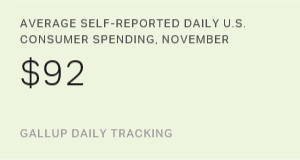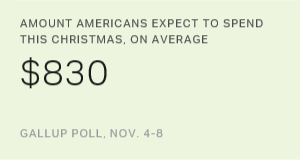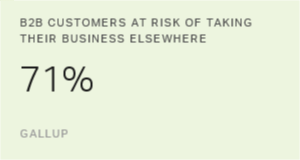Story Highlights
- Average spending increased $7 from November
- December 2015 average similar to December 2014 average
- Spending usually increases in December but drops in January
WASHINGTON, D.C. -- Americans' daily self-reports of spending averaged $99 in December, which is similar to the $98 average in December 2014. Along with the $96 average in December 2013, those are the highest averages for that month in Â鶹´«Ã½AV's eight-year trend. December spending is usually the highest of any month each year, although the highest estimate for any month in Â鶹´«Ã½AV's trend is $114 from May 2008.

Each day, Â鶹´«Ã½AV asks Americans how much they spent "yesterday" in restaurants, gas stations, stores or online -- not counting home, vehicle or other major purchases, or normal monthly bills -- to provide an indication of Americans' discretionary spending. The December 2015 average is based on interviews with more than 13,000 U.S. adults.
Monthly spending averages in 2015 hovered near $90 for most of the year, with January ($81) and February ($82) significantly lower and December ($99) significantly higher than the other months. The average across all months in 2015 -- $89 -- is essentially the same as the 2014 annual average of $90, but much higher than averages of between $64 and $72 from 2009 to 2012.

December typically has one of the highest spending averages of the year, spurred by holiday gift buying as well as increased travel and other holiday-related spending. Spending increased by $7 from November ($92) to December ($99) in 2015, one of the higher November-to-December increases in Â鶹´«Ã½AV's trend.

While spending generally increases from November to December, it often drops steeply in January. The monthly decline has averaged $15 in Â鶹´«Ã½AV tracking from 2009 through 2015. As a result, January's estimate is usually one of the lowest each year.
Bottom Line
Americans' spending was strong in December, at roughly the same level seen in 2014. That it remained high despite the sharp decline in gas prices over the past year suggests consumers were out , a potentially good sign for retailers as well as the economy more generally. This helps reinforce the Federal Reserve's recent decision to begin increasing interest rates in the U.S. However, as spending typically drops in January, this recent high point is likely to be short-lived. How much it drops could be an important indication of whether consumers are going to go back to pocketing their gas savings or engage in higher spending that will fuel economic growth in the new year.
These data are available in .
Survey Methods
Results for this Â鶹´«Ã½AV poll are based on telephone interviews conducted Dec. 1-30, 2015, on the Â鶹´«Ã½AV U.S. Daily survey, with a random sample of 13,703 adults, aged 18 and older, living in all 50 U.S. states and the District of Columbia. For results based on the total sample of national adults, the margin of error for the spending mean is ±$5 at the 95% confidence level. All reported margins of sampling error include computed design effects for weighting.
Each sample of national adults includes a minimum quota of 60% cellphone respondents and 40% landline respondents, with additional minimum quotas by time zone within region. Landline and cellular telephone numbers are selected using random-digit-dial methods.
Learn more about how works.


